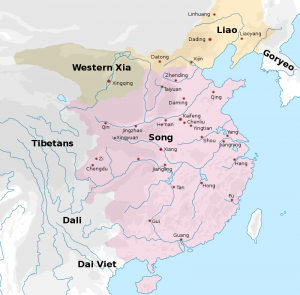The Song Dynasty (960-1279 AD) was a time of great achievement in many different fields. In terms of technology, the world’s first movable type printing press was invented during the Song. In terms of economy, the Song Dynasty saw the rise of private enterprise and the flourishing of trade and commerce. Paper currency was also introduced during the Song. Despite its military weaknesses and the challenges posed by the neighboring Liao and Jin Dynasties, the Song was a golden age for China that laid the foundation for much of the country’s later success.
The Imperial Examination and Meritocracy
The Imperial Examination was first established during the Sui Dynasty (581-618), but it was improved during the Tang (617-907) and reached its peak during the Song. The examination was a way to select the smartest individuals for government service. It was a very competitive exam, and only a small percentage of those who took it actually passed. This helped to create a meritocracy during the Song Dynasty. In a meritocracy, the most talented and capable people are chosen for positions of power, regardless of their social class. As opposed to a system where nobility and aristocracy were the only ones with a chance of holding power, the meritocracy of the Song Dynasty allowed for social mobility.
Achievements in Science, Medicine, and Technology
The Song Dynasty was a time of breakthroughs in science and technology. The development of new irrigation systems and the introduction of new varieties of rice, such as early ripening and drought-resistant strains helped to increase agricultural production, which contributed to the population boom and prosperity of the Song era.
Because the Song Emperors placed a high value on medicine and medical research, traditional Chinese medicine made great strides during this period. The Medical Books Press was established, and there were almost one hundred medical formulas and medical books from the Song Dynasty that have survived to this day. Medicaments were managed by the government exclusively as monopolized commodities.
Forensic science also began to develop during the Southern Song period. The first record of using scientific methods to solve criminal cases is attributed to physician and judge Song Ci in his book Washing Away of Wrongs (Xi Yuan Lu). The book contains information on how to determine the cause of death (poison, strangulation, drowning, etc.) and whether death resulted from murder, suicide, or accident. Song Ci is considered the Founding Father of Forensic Medicine.
The Song Dynasty was a time of great achievement in mathematics as well. Qin Jiushao introduced the “0” symbol into Chinese mathematics, Yang Hui was the first person documented to use negative ‘x’ coefficients in quadratic equations, and Jia Xian invented the Jia Xian triangle—a version of Pascal’s triangle used to determine binomial coefficients—centuries before French mathematician Blaise Pascal.
The world’s first movable type printing press was invented during the Song Dynasty. This invention had a huge impact on the spread of knowledge. Books could now be printed in large quantities and disseminated to a wide audience. Gunpowder was another important invention. The formula for creating gunpowder was invented during the Tang Dynasty, but it was during the Song dynasty when gunpowder was first used in warfare, in weapons such as the fire lance, fire arrow, and eruptor. Gunpowder had uses outside of warfare as well, such as for fireworks, which were popular in festivals.
The famous astronomical clock tower at Kaifeng was designed during the Northern Song Dynasty by the well-known polymath Su Song. It was an impressive feat of engineering that used a hydraulic system and an escapement mechanism to move the figures on the clock. The tower also had a series of large bells that would ring at the hour.
The Song Dynasty was credited with the first use of government-issued paper currency. Merchants used to transport strings of coins when doing business, but carrying numerous amounts of coins was heavy, and they needed a more efficient way to transport money. To solve this problem, they began using paper money. When the government saw its success, it started taking over the production of paper currency.
It was also during the Song Dynasty that the magnetic compass was used for navigation. This tool contributed to the growth of maritime trade. Merchants traded with those from neighboring countries, and foreign trade increased along with domestic trade. Naval exploration missions were also sent to faraway lands, and the Chinese were able to map out more of the world and learn about different cultures. Speaking of naval exploration, it was during the Song Dynasty that a permanent, standing navy was first set up in China. This navy was instrumental in the Jin-Song wars, as well as in defense of China’s coast against pirates.
Conclusion
Overall, the Song Dynasty was a period of great achievement in China across various fields. These inventions and innovations not only had an impact on China but would eventually be transmitted to the rest of the world. In many ways, it laid the foundation for future dynasties and helped China become one of the leading political and cultural powers today.
